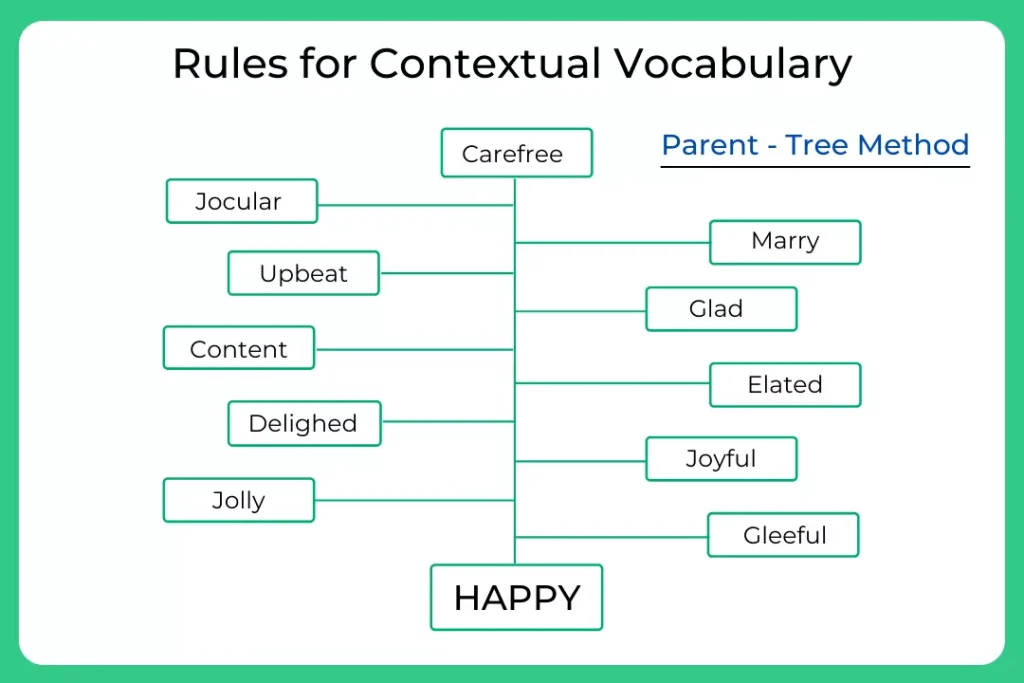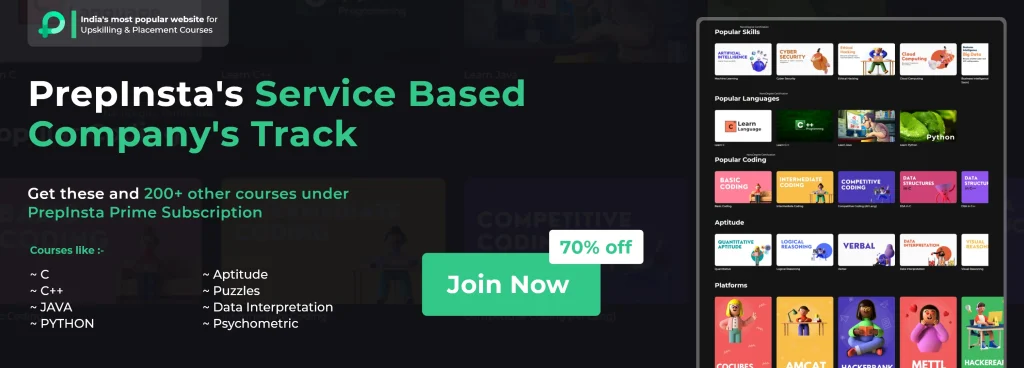Verbal Menu
- Basic Grammar
- Speech and Voices
- Tenses
- Articles
- Tenses and Articles
- Idioms and Phrases
- Subject Verb Agreement
- Prepositions and Conjunction
- Selecting Words
- Relative Pronoun
- Sentence Completion
- Sentence Ordering
- Contextual Vocabulary
- Jumbled Sentence
- Sentence Formation
- Error Identification
- Sentence Improvement and Construction
- Cloze Test
- Fill in the blanks
- Paragraph Ordering
- Para Jumbles
- Synonyms and Antonyms
- Synonyms
- Antonyms
- Reading Comprehension
- Get Off-campus Drive Updates
- Get Hiring Updates
- Contact US
PREPINSTA PRIME
Rules For Contextual Vocabulary
Rules for Contextual Vocabulary
Rules for Contextual Vocabulary help you understand how to choose the correct word by looking at the meaning of the sentence and the words around it. In many English questions, especially in exams, you are tested on your ability to understand the context and select the most appropriate word.
On this page, you’ll find a complete guide to mastering contextual vocabulary—with clear rules and examples to help you get it right every time.
Keep reading to learn how to decode meanings using clues from the sentence and improve your vocabulary skills with confidence!

Rules for Contextual Vocabulary
Contextual can be both tricky and simple for a student. Just having the knowledge of words will be of no use if one doesn’t know how to use in what context. Hence they should follow certain rules to score points in Contextual Vocabulary.
Contextual Vocabulary is the most common method used for learning words. There are basically 4 rules for contextual vocabulary.
- Associative Methods.
- Latin keyword Methods.
- Parent tree Methods.
- Suffix and Prefix Methods.

Contextual Vocabulary - Rules and Examples
(1) Latin Keywords Method-
Latin Keywords methods is the easiest methods to memorize the words. Once, you guess the base meaning of a word, you can easily recognize the meaning of entire sentence.
For Example- Seismic
(a) Seismology is study of earthquake.
(b) Seismologists is the person who study Earthquake.
(2) Parent Tree Method-
This method is very useful to memorize the synonyms and antonyms of words and use them in regular contexts.
For Example-
Take a word that you want to find more similar words for, maybe ‘Outdoor’. So make a point that whenever you come across any other word that relates to the meaning of ‘outdoor’, you parent word, note it down. This way you can get a book full words only with very little study.
Some common related words to outdoor- rustic, outside, garden, alfresco, woods etc.
(3) Associative Methods-
In Associative method try to associate or relate the words with events, picture or image or with other different you.
For Example-
Look the word DEFILE. Let associate with POLLUTE
Now, we all know that POLLUTE meaning is contaminated or harmful substance.
Hence, the DEFILE meaning anything that is impure or spoil.
In Associative Method there is almost a deep connection with the words.
(4) Suffix/Prefix Methods-
Many words in vocabulary doesn’t have keywords so its prefix can be used to know its close meaning. Prefix means the initial letters of a word that can be used to denote it in longer sentences.
For Example-
GEO is prefix of Geology. So, Geologist are the scientist that study the earth and geography is the study of geology.
Prime Course Trailer
Related Banners
Get PrepInsta Prime & get Access to all 200+ courses offered by PrepInsta in One Subscription
More Rules for Contextual Vocabulary
- Read the Entire Sentence Carefully:
Don’t just focus on the blank—understand the complete sentence before choosing a word. - Look for Clue Words or Phrases:
Words like however, therefore, despite, such as, or for example can hint at the tone or direction of the sentence. - Understand the Tone:
Check whether the sentence is positive, negative, humorous, sarcastic, etc. Your word choice should match the tone. - Use Logical Flow:
The word should make sense logically with the rest of the sentence. Ask yourself: Does this word fit the meaning I expect here? - Eliminate the Wrong Choices:
Cross out any words that clearly don’t fit. Narrow down to the most suitable one based on logic and sentence flow. - Know Common Word Families:
Words built from the same root often have related meanings. If you don’t know the word exactly, the root or prefix might help.
Rules for Contextual Vocabulary - Questions
Question 1
The children in the orphanage might have starved had it not been for the benevolence of the nuns, who sacrificed their own small salaries to provide food for the children. Benevolence means…
Options
(A) Favor
(B) Affection
(C) Charity
(D) Gifts
Correct Option (C)
Explanations – Benevolence means good nature or charity
Question 2
One might think that the child would be afraid of such a large animal, but the intrepid young girl ran up to the beast and began scratching it behind the ears. Intrepid means
Options
(A) Thoughtless
(B) Adventurous
(C) Daring
(C) Exciting
Correct Option (C)
Explanation – Intrepid means daring or fearless.
Question: 3
Choose the correct option which shows the opposite meaning to the highlighted word in the sentence
The movie’s plot was filled with coherent twists and turns.
a) Reasonable
b) Incoherent
c) Meaningful
d) Logical
Correct answer: B
Explanation: Coherent means having clarity or intelligibility
Incoherent means lacking clarity or logical order, which is the opposite of “coherent.”. Therefore the opposite of coherent will be ‘incoherent’
Question: 4
Choose the correct option which shows the similar meaning to the highlighted word in the sentence
She possesses an aversion to spicy food.
A) Dislike
B) Attraction
C) Fondness
D) Affection
Correct answer: A
Explanation: Aversion means a thing that you do not like
Dislike has similar meanings. Both words imply a strong feeling of not liking or being repelled by something.
Question: 5
Choose the correct option which shows the similar meaning to the highlighted word in the sentence
The detective showed dedication in solving the mysterious case.
a) Indifference
b) Laziness
c) Negligence
d) Commitment
Correct answer: D
Explanation: Dedication is refer to a feeling of very strong support for or loyalty to someone or something
Dedication has similar meanings. Both words imply a strong sense of devotion and perseverance towards a goal or task.
Also Check Out
Also Check:
- Basic Grammar – Questions | Rules | How to Solve Quickly | Tricks & Shortcuts
- Speech and Voices – Questions | Rules | How to Solve Quickly | Tricks & Shortcuts
- Tenses – Questions | Rules | How to Solve Quickly | Tricks & Shortcuts
- Tenses and Articles – Questions | Rules | How to Solve Quickly | Tricks & Shortcuts
- Idioms and Phrases – Questions | Rules | How to Solve Quickly | Tricks & Shortcuts
- Subject Verb Agreement – Questions | Rules | How to Solve Quickly | Tricks & Shortcuts
- Prepositions and Conjunction – Questions | Rules | How to Solve Quickly | Tricks & Shortcuts
- Selecting Words – Questions | Rules | How to Solve Quickly | Tricks & Shortcuts
- Relative Pronoun – Questions | Rules | How to Solve Quickly | Tricks & Shortcuts
- Sentence Completion- Questions | Rules | How to Solve Quickly | Tricks & Shortcuts
- Basic Grammar
Questions
Rules
How to Solve Quickly
Tricks & Shortcuts - Speech and Voices
Questions
Rules
How to Solve Quickly
Tricks & Shortcuts - Tenses
Questions
Rules
How to Solve Quickly
Tricks & Shortcuts - Tenses and Articles
Questions
Rules
How to Solve Quickly
Tricks & Shortcuts - Idioms and Phrases
Questions
Rules
How to Solve Quickly
Tricks & Shortcuts - Subject Verb Agreement
Questions
Rules
How to Solve Quickly
Tricks & Shortcuts - Prepositions and Conjunction
Questions
Rules
How to Solve Quickly
Tricks & Shortcuts - Selecting Words
Questions
Rules
How to Solve Quickly
Tricks & Shortcuts - Relative Pronoun
Questions
Rules
How to Solve Quickly
Tricks & Shortcuts - Sentence Completion
Questions
Rules
How to Solve Quickly
Tricks & Shortcuts
Get over 200+ course One Subscription
Courses like AI/ML, Cloud Computing, Ethical Hacking, C, C++, Java, Python, DSA (All Languages), Competitive Coding (All Languages), TCS, Infosys, Wipro, Amazon, DBMS, SQL and others

 Apply For Jobs
Apply For Jobs Get Hiring Updates
Get Hiring Updates




Login/Signup to comment